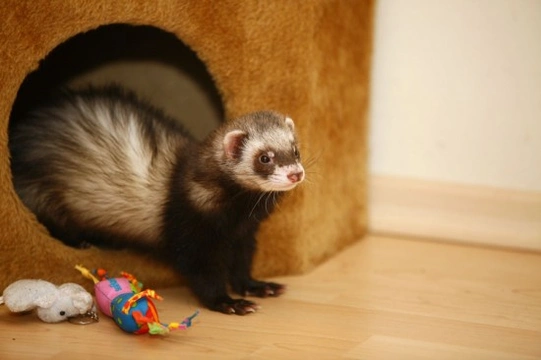
Keeping ferrets as pets
Ferrets- interesting, lively, comical and friendly. Ferrets are rather more demanding than most other caged domestic animals, but if you are prepared to put in the commitment, you will be handsomely rewarded by these loving and personable pets.
For many years kept as working animals for hunting wild rabbits and vermin, today's pet ferrets are descended from wild European pole cats. Many generations of domestication have turned the ferret into an engaging and friendly pet that gives a lot back to any owner that takes care of them.
Ferrets come in a wide variety of colours including albino, black, sable, butterscotch, champagne, cinnamon and chocolate. The colour of their coats can change significantly with the seasons, particularly with ferrets that are kept outside.
How many ferrets should you keep?
Although one ferret can be kept alone, this is not ideal, and you will need to spend significant amounts of time with a lone ferret in order to prevent it from getting bored and lonely. Two ferrets (a male and a female) is fine, and being as they are very sociable animals, so are larger groups of three, four or more, space and facilities permitting.
A home for your ferret
Ferret houses and cages should be well constructed and secure, as ferrets are talented escape artists! The best ferret cages are at least three storeys high and made of safe, sturdy materials which will not trap their paws. A tall, upright house with a floor space of at least two square feet and minimum height of four feet is required. Newspaper flooring and a litter box should be placed on the bottom level of the cage. A water bottle can be attached to the bars, with the food bowl nearby. An enclosed nesting box should be provided, with snug warm bedding.
Ferrets love fresh air, and are sometimes kept outdoors in sheds or specially constructed weatherproof ferret houses. This is one option to bear in mind if you don't have the space inside your home. Ferrets are well known for their distinctive musky odour- particularly the males. This can be greatly reduced by neutering (more on this later) but it never completely goes away- so be aware of this when considering whether you want to keep your ferrets inside your home, or in an appropriately constructed outdoor enclosure.
Your ferret's diet
Ferrets are enthusiastic carnivores, and love to gnaw on chunks of raw meat. For their everyday food, select a high quality complete diet designed for ferrets, to take care of all of their nutritional requirements. Ferrets should not be given sweets and scraps, as this can lead to both tooth decay and behavioural problems. Remember to keep fresh water available at all times.
Keeping your ferret fit
Ferrets are incredibly active animals, and love to investigate, 'ferret about' and play. They require rather more maintenance than other caged animals such as rabbits, because they require daily stimulation and exercise and cannot be left unattended. Plenty of toys in the cage and things to play with is important, to keep your ferrets occupied and stave off boredom.
You should make provision for a run, or safe enclosed room where your ferrets can be let out for as long as possible on a daily basis, in order to exercise, investigate and play. Ferrets love playing with each other and with people, and will often fetch a small ball in the same way that a dog will! Ferrets can also be trained to walk on a lead. They are incredibly intelligent animals, and very interactive. Watching them at play can be exhausting, but always highly amusing!
Neutering your ferret
Female ferrets (known as 'jills') come into season in the spring time and stay in season until mated. Staying in season for prolonged periods of time leads to a condition called aplastic anaemia, which can be fatal, or at the very least make your ferret very ill. Having your female ferret spayed prevents this from happening, and is highly recommended for all ferrets that will not be used for breeding.
Male ferrets (knows as 'hobs) can either be castrated or vasectomised. Castration serves many purposes, such as greatly reducing the strong musky ferret smell, and making your male ferret quieter and easier to handle. Vasectomised ferrets maintain the distinctive ferrety odour and other characteristics of the entire male. The main reason to have a male ferret vasectomised rather than castrated is because they can be used to take an unspayed female ferret out of season, as mentioned above.
Handling and welfare
Ferrets, like all animals, need to be properly tamed in order to be able to interact safely and happily with humans. They have large teeth, and can deliver a deep, nasty bite. They are by no means vicious by nature, but like all animals, need treating with respect. Ferrets can become slightly moody around the breeding season, so be aware of this also. Children should always be supervised with ferrets, and taught the correct and safe methods of handling them.
Make sure any juvenile ferrets you consider owning are the offspring of tame pet ferrets, or if you are considering an already mature ferret that it has been have been properly socialised, well treated and regularly handled.
Pet ferrets can live for up to ten years, and require consistent attention and care on a daily basis. Ferrets can be amazing company and a source of never ending entertainment as they exercise, play and interact with each other. But they are also easily bored and require a lot of stimulation, so before buying, be sure that you will have enough time to make sure of their happiness and wellbeing for the entire duration of their lives.



